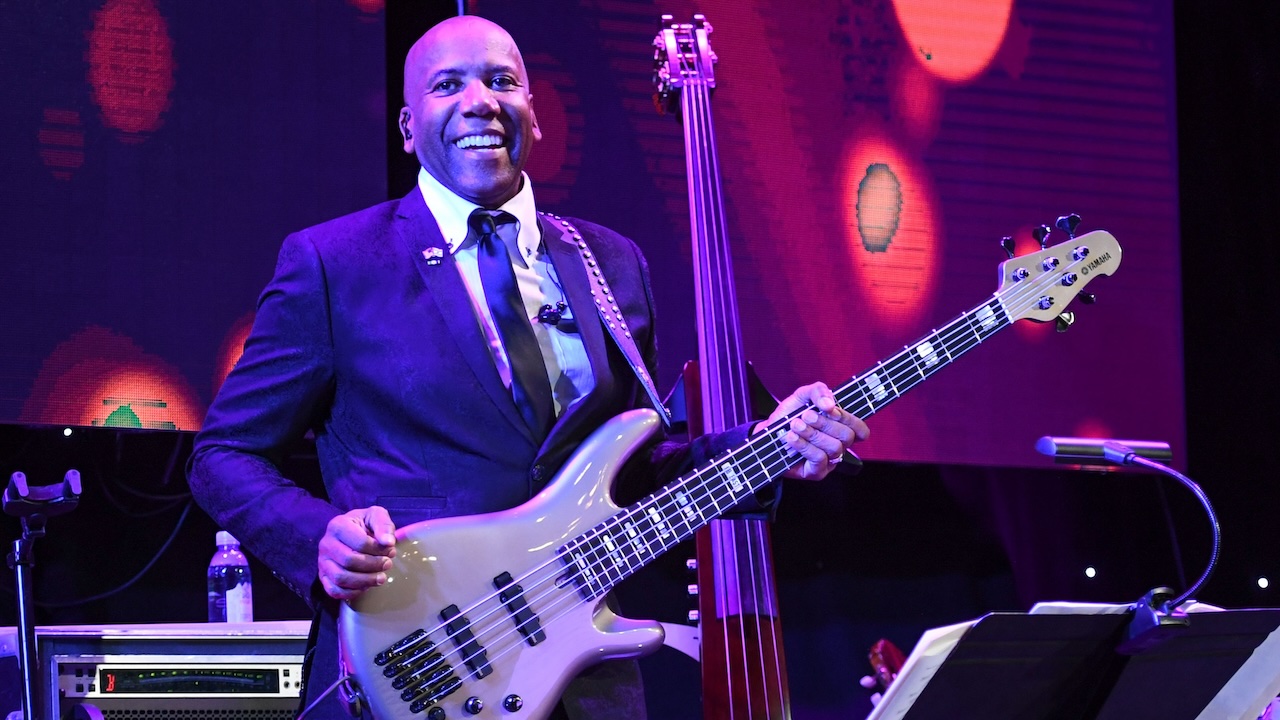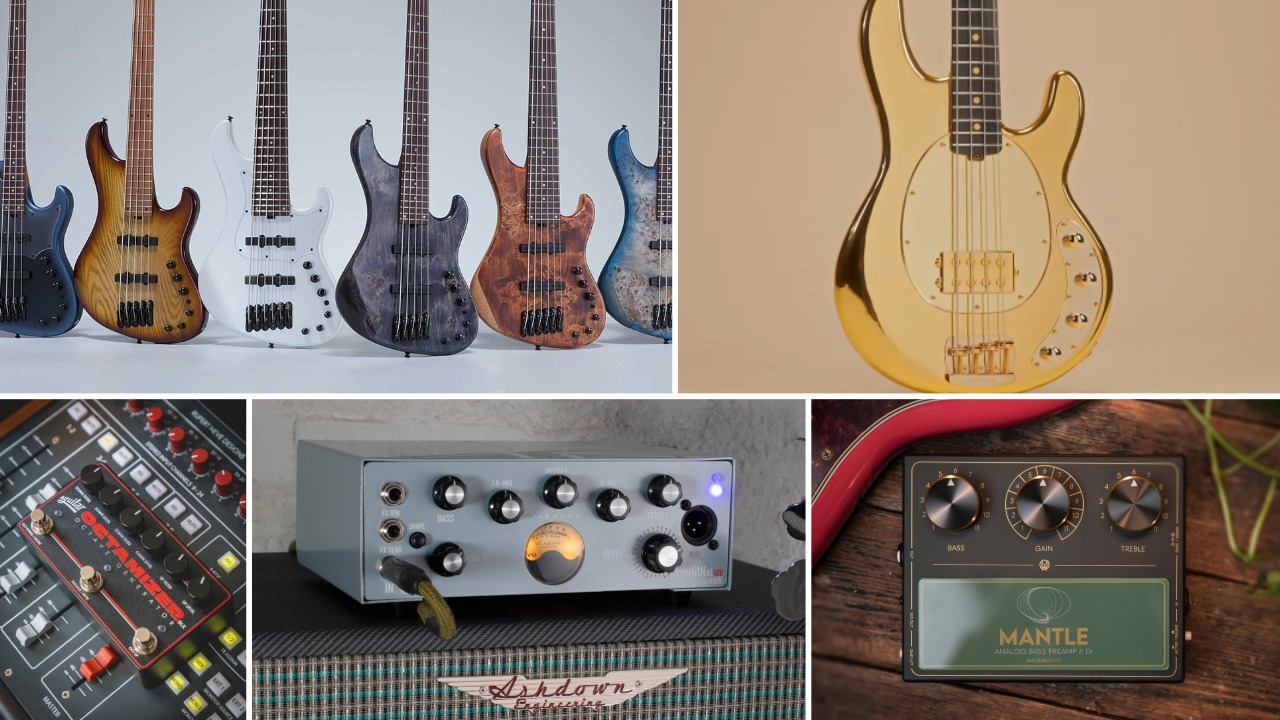“It’s Chuck Rainey’s concept of ‘what you don’t play is as important as what you do play’”: After decades of studio sessions with artists ranging from Eric Clapton to Usher, Nathan East reflects on the business of bass
Nathan East looks back at some of his biggest tracks, and why he’d love to have a career like Pat Metheny or Marcus Miller

By now, the bass guitar world has grown accustomed to Nathan East breaking new ground – from the R&B/funk dimension he brings to rock god Eric Clapton, to the considerable writing, singing, and soloing skills he displays with jazz über-group Fourplay, to the “real” bass he adds to mechanized Top 40 hits by artists like Mary J. Blige, Justin Timberlake, Usher, and Daft Punk.
As a sideman for over 50 years, there's nothing East hasn't done. Seminal recordings with Lionel Richie, Kenny Loggins, Whitney Houston, Michael Jackson, and Elton John, as L.A.'s first-call bassman? Check. Performing and touring across six continents with artists like George Harrison, Sting, Herbie Hancock, and Toto? Done. Co-writing a No. 1 hit – Easy Lover, with Phil Collins and Philip Bailey? Yessir. Somehow, East has also found time to head in the direction of solo artist.
“When I was coming up I’d read interviews with everyone,” East told Bass Player. “I’d read every word and think that was what I had to do. Chuck Rainey, James Jamerson, Quincy Jones… people pay attention to those guys.
“Chuck Rainey said once he grew his fingernails if he wanted a little more attack like a pick, so I did that. People are always trying to carve something out, so you can’t lose sight of what you’re doing. There’s always something to learn.”
The following interview from the Bass Player archives took place in April 2014.
How do you balance your incredibly busy road and studio schedules?
“Basically, I just take it as it comes. The catch is now with Pro Tools I do a lot of my session work while I'm out on tour. Producers send me Pro Tools files wherever I am. Harvey Mason Jr. is producing a new Backstreet Boys record, and he's sending me some tracks to play on. For the new Fourplay album, the guys sent me a hard drive, and I added some of my bass parts that way.”
All the latest guitar news, interviews, lessons, reviews, deals and more, direct to your inbox!
How has the session scene changed for you?
“The L.A. scene has changed so much; you used to be able to go out to clubs like the Baked Potato on a Tuesday night and get schooled by Jeff Porcaro or Lee Ritenour or Abe Laboriel, who were in studios by day and the clubs by night. Now, both scenes have tapered off a great deal.”
You’ve spoken before about how important the groove is in your career.
“The groove is the foundation of all music. It's the brick, mortar, and concrete that everything else is built upon. It's the pocket, the alley; it's undeniable; it's the feel-good portion, Groove is a matter of the heart, not of the head, as is the case with most music. The time is just the meter, but the groove is an individual thing, and the bass and drums are largely responsible for that.”

What do you do if you're having trouble feeling the groove on a song?
“I usually start by simplifying; that way I can really hear what's going on. I weed out as much as I can so I can listen and figure out how to react. It's Chuck Rainey's concept of ‘what you don't play is as important as what you do play.’
“I listen to the whole drum kit and try to place my part right in the sweet spot. When the groove is really happening, you find yourself in a position of being a listener – you're actually on the outside looking in. It's like a little Zen zone where you feel like the groove is playing you. You're just allowing it to happen.”
How did you approach Eric Clapton's Me and Mr. Johnson?
“We all listened to Robert Johnson's original guitar versions of the tunes. There was no reference for bass, so I revisited a few Willie Dixon recordings, and I checked out some modern blues bassists, just to get a cross-section of what those guys are doing.
“From there, I took a minimalist approach while trying to come up with something a little more interesting than typical blues figures. I used a rented upright, and I played my Yamaha 5 with a lot of palm-muting.”
You often used non-root tones on downbeats and IV chords. Was that part of your concept, or was it based on something Johnson was doing on guitar?
“A bit of both. I wanted it to sound raw in the Johnson tradition, but also be interesting. Non-roots can be nice in a melodic, voice-leading way.
“Another challenge is the odd phrase lengths Johnson wrote-like on Come On in My Kitchen, If I Had Possession Over Judgment Day, and especially Hell Hound on My Trail – which can be tricky if you're locked in a moving pattern. The idea is to make them all sound smooth.”
What do you remember about writing Easy Lover with Phil Collins?
“We were in the studio in London and had pretty much finished the album. Phillip Bailey expressed to me that we still needed that one, undeniable single for the record label to release. I went to the piano and started playing the basic changes to the song and in about 20 minutes we had the music written.
“We recorded what we considered a rough demo of the song that night and the next morning when we came back in to listen to it, we all loved the track!”
“Phil Collins took the track home and came back with the lyrics. His voice sounded so good as he sang it back to us that we all had the same epiphany, this should be a duet! They worked out their parts, went into the vocal booth, sang the song and the rest as they say is history.”
You also played on Stevie Wonder's A Time to Love.
“What a thrill! That album takes you back to the good ol' Stevie that we all know and love. His longtime bassist, Nathan Watts, is on the album, and I played a lot of upright – a bass we rented in L.A. – with Ricky Lawson on drums.”
What led you to cover Sir Duke on your solo album?
“I was in a Norway seaside village with Toto, and when we got back to the hotel from the gig, there was an 18-piece big band playing a wedding in one of the ballrooms. Simon Phillips and I stuck our heads in, and as soon as the bass player saw me, he took off his bass and handed it to me.
“They broke into Sir Duke, and the dance floor was packed. I'm thinking, we're 6,000 miles from home, and everybody is dancing; I've got to record it.”
“I used my 5-string for the groove and another 5-string tuned with a high C string for the melody. Bryan Lenox, our engineer in Nashville recorded direct to 2" tape, in addition to Pro Tools, which gave the bass an aggressive sound. I was able to get that Nate Watts growl, which led me to quote a bit of Do I Do, too.”
Stevie himself joins you on harmonica to play on Overjoyed.
“That came out of a late '90s Rainforest benefit concert soundcheck at Carnegie Hall, with Sting, James Taylor, Bonnie Raitt, and Elton John. There was a break onstage and everyone was sitting around, so I began messing with some chords, and I realized, Oh, that's Overjoyed.
“I started to play it chord-melody-style, and suddenly I heard the melody on harmonica; I looked up and it was Stevie! Now I was on the spot, literally working out the changes as I went along, with all of these stars watching us.
“We got through the whole tune, including the modulation, and everyone broke into spontaneous applause! And Stevie said to me, ‘Nate, if you ever record that, let me know and I'll play on it.’ So, I held him to it.
“My brother Marcel and I put together a version with just me and Greg Phillinganes and Paulinho da Costa, and I took it over to Stevie's studio after recording some songs there for A Time to Love. He pulled out his harmonica, and that's what you hear – a 4 AM first take from Stevie!”
How did the opportunity to play for Daft Punk’s Random Access Memories album come to pass?
“It came out of the blue, they came directly to me. The first time I heard Get Lucky, I thought, ‘Wow, I love this’, but you just don’t know how big it might be. Because Daft Punk wear masks, they play 45,000 seat venues, but then after the show, they walk home with the crowd and no-one knows who they are!”
What other musical goals do you have?
“Man, if it just stays at the pace it's been on for the past 20 years I'll be thrilled. But I do want to get my solo career together. I’d love to have a career like Marcus Miller's or Pat Metheny’s – they do a variety of projects but maintain a steady solo side as well. That's what I'd like my twins to see Daddy doing.”
What's your advice to aspiring session bassists?
“A key point is that you don't necessarily have to move to New York or L.A. anymore. Technology has made it a whole new game – you can be in Cleveland and killing it! You're just as likely to be on a hit record there as you are in L.A.
“I suggest setting up a home studio around your computer, and then start writing tunes. Find out who's doing jingles, CDs – any recording in your area. The best thing you can do is start stirring it up right there in your hometown.”

Nick Wells was the Editor of Bass Guitar magazine from 2009 to 2011, before making strides into the world of Artist Relations with Sheldon Dingwall and Dingwall Guitars. He's also the producer of bass-centric documentaries, Walking the Changes and Beneath the Bassline, as well as Production Manager and Artist Liaison for ScottsBassLessons. In his free time, you'll find him jumping around his bedroom to Kool & The Gang while hammering the life out of his P-Bass.


